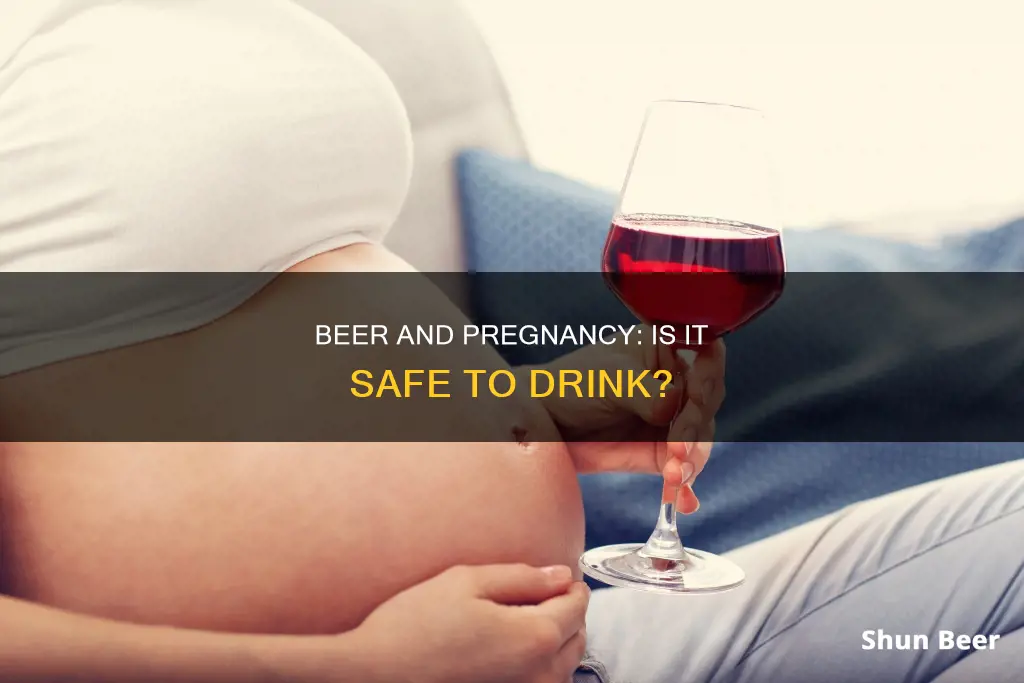
Drinking alcohol during pregnancy is a controversial topic, with strong arguments for and against. While some doctors recommend completely avoiding alcohol when expecting, others argue that occasional light drinking is unlikely to harm the baby. National health organizations, including the CDC, the U.S. Surgeon General, the American College of Obstetricians and Gynecologists, and the American Academy of Pediatrics, advise pregnant women to abstain from alcohol entirely. Heavy alcohol consumption during pregnancy has been linked to fetal alcohol spectrum disorders (FASDs), which can cause low birth weight, developmental delays, behavioral problems, and health issues such as seizures and visual or hearing impairments. However, the effects of light or moderate drinking are less understood, and some studies suggest that low to moderate alcohol consumption during pregnancy may not have adverse effects on the child. Ultimately, it is a personal decision for pregnant women, and they should consult with their doctors to make an informed choice.
| Characteristics | Values |
|---|---|
| Recommendations by official health organizations | The NHS, the American College of Obstetricians and Gynecologists, the United Kingdom's Royal College of Obstetricians and Gynaecologists, the CDC, the U.S. Surgeon General, and the American Academy of Pediatrics all recommend that pregnant women abstain from drinking alcohol. |
| Recommendations by doctors | Some doctors recommend that pregnant women completely avoid alcohol, while others say that occasional light drinking is unlikely to harm the baby. |
| Alcohol's impact on the baby | Alcohol passes from the pregnant woman's blood through the placenta to the baby and can seriously affect its development. The baby's blood alcohol level remains increased for longer than the mother's, which can cause lifelong damage. |
| Alcohol's impact on the mother | Drinking during pregnancy increases the risk of miscarriage, premature birth, and the baby having a low birth weight. |
| Fetal Alcohol Spectrum Disorder (FASD) | Drinking during pregnancy can cause the baby to develop FASD, which can lead to problems with learning, behaviour, joints, bones, muscles, organs, managing emotions, developing social skills, hyperactivity, and impulse control. |
| Fetal Alcohol Syndrome (FAS) | Heavy alcohol use during pregnancy has been linked to FAS, which can cause babies to be born prematurely and underweight, with possible characteristic facial features like a thin upper lip and small eye openings. |
| Studies on low-level alcohol consumption during pregnancy | A 2012 Danish study found no difference in the development of 5-year-old children born to mothers who drank low to moderate amounts of alcohol compared to those who abstained. However, a 2021 study suggested that alcohol consumption during pregnancy leads to smaller placentas with abnormal blood vessels and abnormal function. |
What You'll Learn
- Drinking alcohol while pregnant can lead to fetal alcohol syndrome (FAS)
- Heavy alcohol consumption during pregnancy can cause birth defects
- The effects of occasional drinking during pregnancy are not well understood
- The risks of light and moderate drinking during pregnancy are unclear
- The impact of drinking alcohol during pregnancy is unpredictable

Drinking alcohol while pregnant can lead to fetal alcohol syndrome (FAS)
When a pregnant person consumes alcohol, it passes through the bloodstream to the fetus through the umbilical cord. The fetus cannot metabolize alcohol in the same way as an adult, so it stays in the body for a longer period. Alcohol can kill cells in different parts of the fetus, disrupting nerve cell development and constricting blood vessels, which slows blood flow to the placenta. This results in a shortage of oxygen and nutrients for the fetus. Additionally, toxic byproducts produced during alcohol processing can concentrate in the baby's brain cells, causing further damage.
FAS is the most severe condition within a group of conditions called fetal alcohol spectrum disorders (FASDs). FASDs can cause a range of physical, cognitive, and behavioral abnormalities, including partial fetal alcohol syndrome, alcohol-related neurodevelopmental disorder, alcohol-related birth defects, and neurobehavioral disorders associated with prenatal alcohol exposure. These disorders can result in lifelong challenges for individuals, impacting their ability to understand and follow directions, control emotions, communicate, and perform daily life skills.
The effects of FAS can vary, but infants with the syndrome may exhibit abnormal facial features, such as a smooth ridge between the nose and upper lip, a thin upper lip, and small eyes. They may also experience sleep and sucking difficulties, as well as vision or hearing problems. As they grow older, children with FAS may have delayed speech and language development, difficulty concentrating, poor judgment skills, learning disabilities, and poor school performance.
While the exact statistics on FAS are challenging to determine due to varying symptoms and severity, it is estimated that less than 2 cases of FASD occur per 1,000 live births in the United States. However, when considering the entire spectrum of FASDs, the frequency may be as high as 1 to 5 out of every 100 children in the U.S. and Western Europe.
To prevent FAS and FASDs, it is recommended that pregnant individuals or those planning to become pregnant abstain from consuming alcohol. While some studies suggest that low to moderate alcohol consumption during pregnancy may not cause harm, the exact amount of alcohol that can lead to FAS is unclear. Therefore, the safest option is to avoid alcohol completely during pregnancy to minimize any potential risks to the baby.
Beer and Bone Grafts: What You Need to Know
You may want to see also

Heavy alcohol consumption during pregnancy can cause birth defects
Alcohol consumption during pregnancy can have detrimental effects on the unborn child, and heavy drinking is linked to an increased risk of birth defects. When a pregnant woman consumes alcohol, it passes through the placenta to the baby, who does not have a fully developed liver to process it effectively. This results in higher and more prolonged alcohol levels in the baby's body.
Heavy alcohol consumption during pregnancy has been identified as the leading preventable cause of mental retardation in offspring in the United States. It is associated with fetal alcohol syndrome (FAS) and alcohol-related neurodevelopmental disorders (ARND). Children with FAS may be born prematurely, exhibit characteristic facial features, and have growth and central nervous system problems, including learning difficulties. ARND, on the other hand, is characterised by learning and behavioural issues due to in utero alcohol exposure, often manifesting as problems with mathematics, memory, impulse control, judgement, and school performance.
Binge drinking, defined as consuming four or more drinks in two hours for women, has been found to be particularly harmful to the developing fetus. Animal studies have shown that exposing the fetus to high blood alcohol concentrations over short periods is more detrimental than continuous drinking patterns, even if the overall amount of alcohol consumed is lower. Binge drinking during critical periods of brain development can lead to severe cognitive and behavioural deficits in the child.
Additionally, heavy alcohol consumption during pregnancy increases the risk of miscarriage, stillbirth, and low birth weight. It can also cause alcohol-related birth defects (ARBD), including abnormalities in the heart, kidneys, bones, and hearing.
While the effects of occasional or light drinking are less clear, it is generally recommended that pregnant women or those planning to become pregnant abstain from alcohol completely to minimise any potential risks to the baby.
Beer and Hives: Is There a Connection?
You may want to see also

The effects of occasional drinking during pregnancy are not well understood
While heavy alcohol consumption during pregnancy is known to be harmful to the baby, the effects of occasional drinking are less understood. The general consensus is that there is no safe amount of alcohol consumption during pregnancy. However, the potential effects of small amounts of alcohol on a developing baby are not well understood.
The American College of Obstetricians and Gynecologists and the United Kingdom's Royal College of Obstetricians and Gynaecologists Women both advise that women should not consume any alcohol during pregnancy. This is because alcohol has been linked to fetal alcohol syndrome (FAS), a long-term and irreversible condition. Babies born with FAS may be born prematurely and are often underweight. They may also have characteristic facial features, such as a thin upper lip and small eye openings. In addition, children with FAS may experience learning and behavioural problems, as well as issues with joints, bones, muscles, and certain organs.
Despite this clear advice, up to half of women drink some alcohol during pregnancy. Some studies have suggested that low to moderate alcohol consumption during pregnancy may not be harmful. For example, a 2012 Danish study found that low to moderate alcohol consumption during pregnancy did not affect executive functioning in 5-year-olds. However, it is important to note that children's brains are still developing at age 5, and the full effects of alcohol may not yet be measurable.
Another study, published in the journal Obstetrics and Gynecology, found that small amounts of alcohol early in pregnancy may not increase the risk of high blood pressure complications, premature birth, or low birth weight. However, it is important to note that this study only looked at birth outcomes and did not examine the potential long-term effects on the child's development.
Ultimately, the effects of occasional drinking during pregnancy are not well understood. While some studies suggest that low to moderate consumption may be safe, there is no definitive evidence to support this claim. As a result, the best advice is to avoid any alcohol consumption during pregnancy to minimise the risk to the baby.
Beer Drinking: Throat Damage and Health Risks
You may want to see also

The risks of light and moderate drinking during pregnancy are unclear
The consensus among medical professionals is that drinking alcohol while pregnant is not recommended. However, the risks of light and moderate drinking during pregnancy are unclear.
Heavy alcohol consumption during pregnancy has been linked to fetal alcohol spectrum disorders (FASDs), which can cause low birth weight, developmental delays, behavioural problems, and health issues such as seizures and visual or hearing impairment. As such, national health organisations recommend complete abstinence from alcohol during pregnancy.
However, the effects of light or moderate drinking are less understood. Some studies suggest that low to moderate alcohol consumption during pregnancy does not affect executive functioning in children. For example, a 2012 Danish study found no difference in IQ, attention span, and executive functions such as planning, organisation, and self-control among 5-year-olds whose mothers drank low to moderate amounts of alcohol during pregnancy compared to those who abstained. Additionally, a 2010 study in the UK reported that children of women who drank up to one to two alcoholic drinks per week or on occasion while pregnant were not at an increased risk of behavioural or cognitive problems.
However, it is important to note that the potential effects of light or moderate drinking on a developing baby may not be fully understood yet. Alcohol passes through the placenta to the baby, and the baby's liver cannot process alcohol. Additionally, the amount of alcohol considered "light" or "moderate" may vary, and there are no clear guidelines on how much alcohol is safe during pregnancy. Therefore, until more research is conducted, it is recommended that pregnant women avoid alcohol altogether.
It is also worth noting that some women may feel judged or ashamed for drinking during pregnancy, and it is essential to respect their autonomy and provide non-judgmental support and education. If a woman is concerned about her alcohol consumption during pregnancy, she should consult her doctor or a healthcare provider for advice and support.
Beer and Breast Milk: Does Drinking Beer Help?
You may want to see also

The impact of drinking alcohol during pregnancy is unpredictable
When a pregnant woman drinks alcohol, it passes through her blood and into the baby's blood, tissues, and organs. Alcohol takes longer to break down in the baby's body, meaning its blood alcohol level remains high for longer than the mother's. This can cause serious issues with the baby's development, and can sometimes lead to lifelong damage.
The more a pregnant woman drinks, the greater the risk to the baby. Drinking during pregnancy increases the risk of miscarriage, premature birth, low birth weight, and fetal alcohol spectrum disorder (FASD). FASD can cause a range of problems, including learning and behavioural issues, problems with movement and balance, and speech and language delays.
However, the specific impact of occasional or light drinking is less clear. Some studies suggest that low to moderate alcohol consumption during pregnancy may not be harmful to the baby. For example, a 2012 Danish study found no difference in IQ, attention span, and executive functions between 5-year-old children whose mothers drank low to moderate amounts of alcohol during pregnancy and those who abstained completely.
On the other hand, other studies suggest that even small amounts of alcohol can affect a baby's developing brain. Additionally, it is difficult to predict the impact of drinking on any given pregnancy, as some women have higher levels of the enzyme that breaks down alcohol. As a result, the baby of a pregnant woman with low levels of this enzyme may be more susceptible to harm.
Due to the unpredictable impact of alcohol on pregnancy, national health organizations and medical professionals recommend complete abstinence from alcohol during pregnancy. While this may seem like a strict guideline, it is important to remember that the potential risks to the baby are serious and can be lifelong. Therefore, it is always better to be safe than sorry when it comes to drinking during pregnancy.
Beer and Protein Shakes: Safe Combo or Not?
You may want to see also
Frequently asked questions
The NHS, the CDC, the U.S. Surgeon General, the American College of Obstetricians and Gynecologists, and the American Academy of Pediatrics all advise pregnant women not to consume any alcohol during pregnancy. While some sources say that a small amount of alcohol is unlikely to be harmful, there is no definitive answer as to how much alcohol it takes to cause problems. Therefore, it is recommended that you avoid drinking alcohol if you are pregnant or planning to become pregnant.
Drinking alcohol during pregnancy can lead to fetal alcohol spectrum disorder (FASD), which can cause problems with learning and behaviour, joints, bones, muscles, and some organs, managing emotions and developing social skills, hyperactivity and impulse control, and communication, such as problems with speech. It can also increase the risk of miscarriage, premature birth, and low birth weight.
If you drank alcohol before knowing you were pregnant, it is recommended that you stop drinking as soon as you find out. The risks of your baby being affected are likely to be low, but if you are concerned, you should talk to a midwife or doctor.







